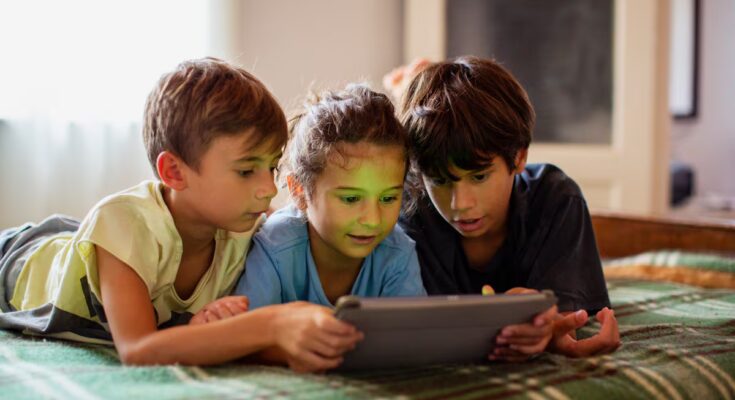152 million people around the world play Roblox every day. With a peculiarity: almost 40% of the users of this video game platform are under 13 years old and appreciate interactive environments such as Brookhaven OR Grow a garden. But they also share that virtual playground with adults who aren’t required to verify their identity to participate. Children who have been taught not to talk to strangers on the street share games and chats on Roblox with an adult from anywhere in the world without even knowing it. And as its popularity has grown in recent years, so have the problems: adults use it to molest minors, bullying among peers, exposure to violent scenes and cases of addiction or fraud linked to the purchase of his virtual currency called Robux. The company has responded by announcing measures such as facial recognition of users, but it is still in the crosshairs of parents, doctors and prosecutors, who accuse it of not doing enough to care for children.
The platform has been in the eye of the storm since August, when it deleted the accounts of several “vigilantes” in the United States, people who patrolled the games as volunteers to spot suspected harassment and warn of security breaches. Roblox justifies blocking the accounts because they “began impersonating children and actively trying to connect with adult users,” which violates its terms of use.
Following the riots, the company was sued by several prosecutors in the United States, where it has its headquarters, the latest being in Texas. Attorney General Ken Paxton accuses her of “profiting from a digital park that hides predators and psychological manipulation behind a facade of family fun.” He has already faced charges in Florida, Louisiana and Kentucky and is also facing charges from private individuals. A Dallas family is suing for premeditated murder after the suicide of their son, who they say was convinced by an adult to disable the game’s parental controls and move the conversation to Discord, another gaming platform, where he blackmailed him after asking for intimate photos and videos.
Roblox announced this Tuesday a feature that allows the user to verify their age with the camera through facial recognition estimation to access communication functions. As reported, once you’ve assigned an age range, the platform will only allow you to chat with participants of “similar ages” – for example, someone who is 12 years old will only be able to chat with people 15 years old or younger. The company has opened a period for voluntary identification and announced that it will be mandatory in early December in selected markets such as Australia, New Zealand and the Netherlands, and in the rest of the world in January.
Police investigations
The increase in questions about Roblox has led to a request for a report from the chief inspector of the child protection group of the Central Cybercrime Unit of the Spanish National Police. The report states that, between 2019 and September 2025, there were 24 investigations into crimes of sexual abuse, prostitution, incitement to suicide and scams against minors on Roblox, and six arrests were made. Three investigations remain ongoing.
The inspector, who prefers to remain anonymous, clarifies that this is not an official statistic, but data to evaluate the evolution of the phenomenon. It is not the platform from which they receive the most complaints, but they preferred not to mention the rest so as not to alert those under investigation: “There is an increase in complaints on practically all platforms, which is logical, because this modus operandi is favored by this type of messaging applications where minors can share audio, video, image files and chat with people they don’t know.”
Roblox is just another one of these channels. Police receive cases from private individuals and from NCMEC, the international organization to which U.S.-based companies are required to report detection of suspicious behavior.
The greatest risk for children, according to specialists, is in chat, which does not allow photo sharing and is monitored by artificial intelligence and a group of operators, but which some adults make fun of by using a coded language to communicate or by inviting children to chat and exchange images through other messaging applications with less control.
The alarm of pediatricians
The Spanish Society of Adolescent Medicine (SEMA) and the Health Promotion Committee of the Spanish Association of Pediatrics (AEP) raised an alarm in September, after noting in consultations an increase in cases of children and adolescents presenting “worrying symptoms” linked to the misuse of Roblox.
“Self-harm, significant changes in behavior, anxiety, insomnia, social withdrawal, unusual comments or attitudes about sexuality, identity, or violence” are signs they notice. They also warn of the addiction their points system can generate.
María Angustias Salmerón, pediatrician and member of the Health Promotion Committee of the AEP, explains: “We are seeing many cases, taking into account that we are the tip of the iceberg, if there are consultations on this it is because there is a serious problem.” He comments that his colleagues in different parts of Latin America have noticed similar diagnoses.
The doctor recommends that parents “be proactive in researching where their children play on the Internet, ask them if they have had any situation that made them feel uncomfortable and, if the slightest problem is detected, go to the pediatrician so he can evaluate it”. Many are unaware of Roblox parental controls. They will have to create their own account to link it to the child’s account so they can delete the chat, block users or experiences, limit purchases and time spent in front of the screen each day and see which games they spend the most time on.
When asked, Roblox responded via email: “Every day we see an average of 6 billion chat messages and 1.1 million hours of voice communications in dozens of languages, where the vast majority is daily chat, but a small number of malicious individuals attempt to circumvent our system.” They argued that “bad actors adapt to evade detection” and recommend “ensuring that children have an account with the correct information such as date of birth so that they have additional protections by default and that they view age-appropriate content.”
Antonio Planells, TecnoCampus professor at Pompeu Fabra University, comments that Roblox “discovered that much of its rapid growth was due to being a social network with a very friendly aesthetic, where minors felt very comfortable playing and it didn’t know how to handle it.” For the professor, the key “is not so much in the access filter, but in the fact that a minor exposed on the platform has no defense or protection mechanisms” and believes that “we need to invest in transforming it into a safe space from control in the creation and effective and extensive moderation of the activity”.
The Spanish Data Protection Agency (Aepd) has initiated proceedings against Roblox for “pornographic or violent content” which it claims allows access “without restrictions” and “the processing of personal data of children aged 13 and 14, considered minors under the law”. law on the protection of personal data and guarantee of digital rights.” It is also investigated that “it is possible to register as a new user by providing a date of birth, a fictitious user name and a password”. To this the Aepd responded that it cannot provide information on ongoing cases.
Through two evaluations of the platform, carried out before and after the new parental controls, the British ethnographic research agency Revealing Reality concluded that there have been improvements, but that “age verification remains insufficient, adults can easily infiltrate spaces reserved for minors and chat and voice moderation are not entirely effective”.
Their recommendation is strong: “Don’t rely on platform promises or research reports, including ours, to decide whether Roblox is right for your child. Create your account, spend time in the spaces you use, and make your own informed decision.”



